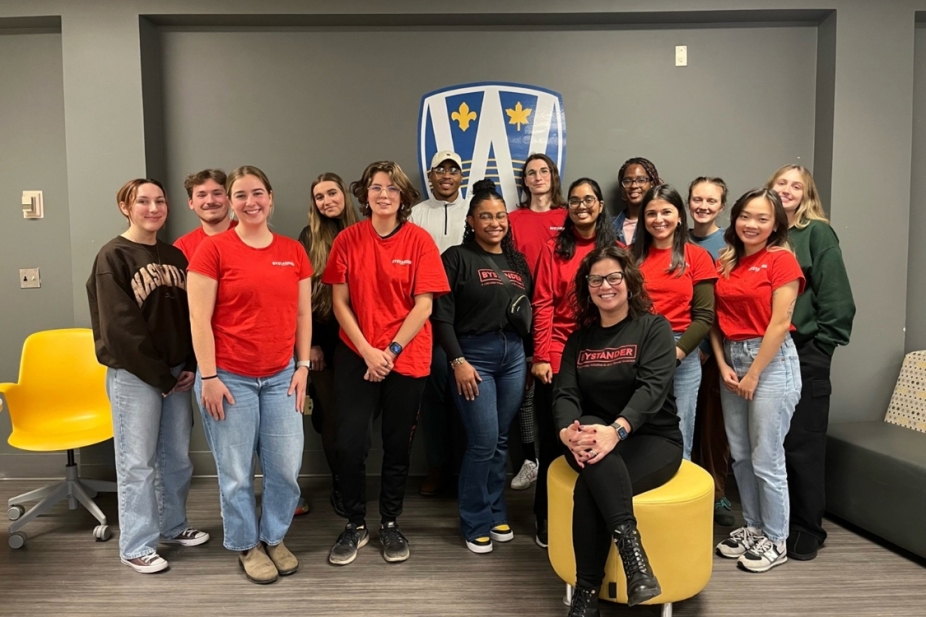
Five years on, Bystander Initiative strengthens prevention efforts Participants of the Bystander Initiative course. (Courtesy Frances Cachon) We cannot change what we do not acknowledge, says learning specialist Frances Cachon. As the University of Windsor’s Bystander Initiative marks five years since its campus-wide expansion, Cachon, the program’s coordinator, emphasizes the importance of addressing difficult topics head-on. “By getting comfortable in the discomfort, that's where the potential for real transformation lies,” she said. “Having public, informed and open conversations that matter is how we create meaningful social change.” The initiative encourages students to safely intervene in situations of harm, with a focus on preventing sexual violence. Launched in 2011 by psychology professor Charlene Senn and Anne Forrest, then director of women’s and gender studies, the program has since grown to include campus-wide workshops, the most cross-listed undergraduate courses and partnerships across faculties. The Bystander Initiative…

Virtual Think Tank to Ignite Health Research Collaborations WE-SPARK Health Institute invites researchers, students, healthcare professionals, and community partners to join our next Think Tank on Thursday, October 24, from 1:00 – 3:00 p.m. on Zoom. This interactive session is designed to spark new ideas, tackle pressing challenges, and build meaningful collaborations that drive impactful health research. Featured Projects Co-Creating and Evaluating Mental Health Solutions for High School Students Hillary Peladeau, United Way Centraide Windsor-Essex Maia Williamson, On Track to Success Exploring partnerships to support high school students while creating opportunities to study and evaluate impact. Input from community organizations, health partners, funders, and academics is welcome. Establishing a CBCT Imaging Platform for Predicting Tumour Response Using Radiomics and Machine Learning in Lung Cancer Laura D'Alimonte, Windsor Regional Hospital An open discussion seeking collaborators with expertise in AI, machine learning, and methodological…
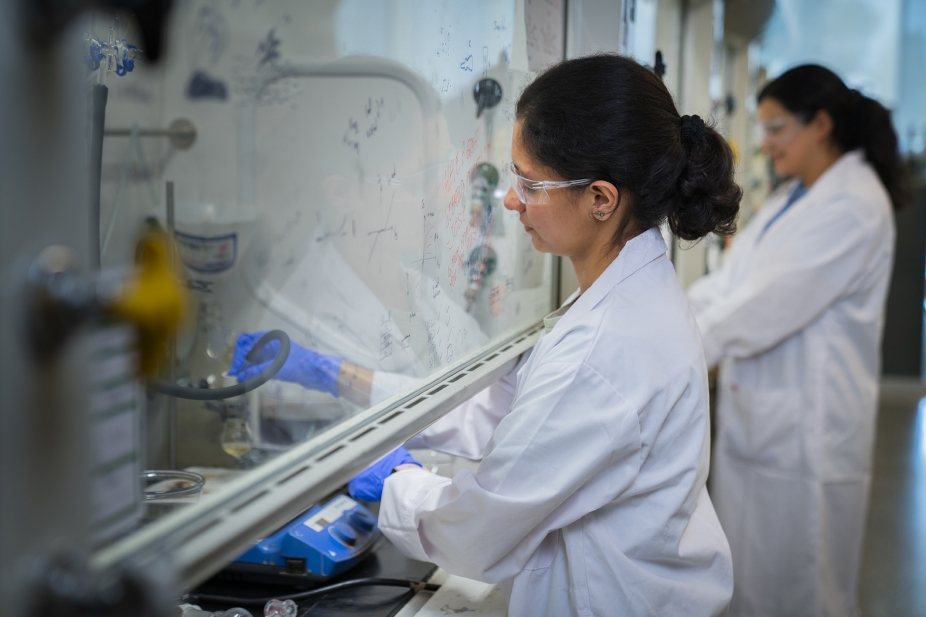
WE-SPARK champions mental health researchers through transformative grant Researchers perform lab study in the Essex Centre of Research (CORe). (FILES/University of Windsor) In a significant boost to the well-being, mental health and professional development of individuals in the research community, WE-SPARK has announced the launch of Program LEAD: How Can a Program Focused on Professional and Lifelong Learning Support the Mental Well-Being of Highly Qualified Personnel Engaged in Health Science Research? Funded through WE-SPARK Health Institute’s Igniting Discovery Grant, the project explores how structured learning opportunities in leadership, self-awareness, community building, and professional identity can foster a healthier, more sustainable research culture. Set to launch this fall, the timely and transformative program supports an innovative collaboration led by Isabelle Barrette-Ng, principal investigator, Integrative Biology, Faculty of Science at the University of Windsor, in partnership with leading educators and researchers from across Canada. …
WE-SPARK After Dark: Health Researchers Networking Event – October 2 WE-SPARK Health Institute is hosting its next After Dark networking event on Thursday, October 2, from 5:00 – 7:00 p.m. at The Bourbon Tap & Grill, 1199 Ottawa Street in Windsor. This monthly series brings together researchers, students, professionals, and community members who share an interest in health research. It’s a great opportunity to connect, exchange ideas, and learn more about the exciting research happening right here in our community. The event is FREE and open to everyone, whether you’re involved in research or just curious to explore it. Attendees will also have a chance to win two Cheers to Hope tickets (valued at $300). Click here to register.
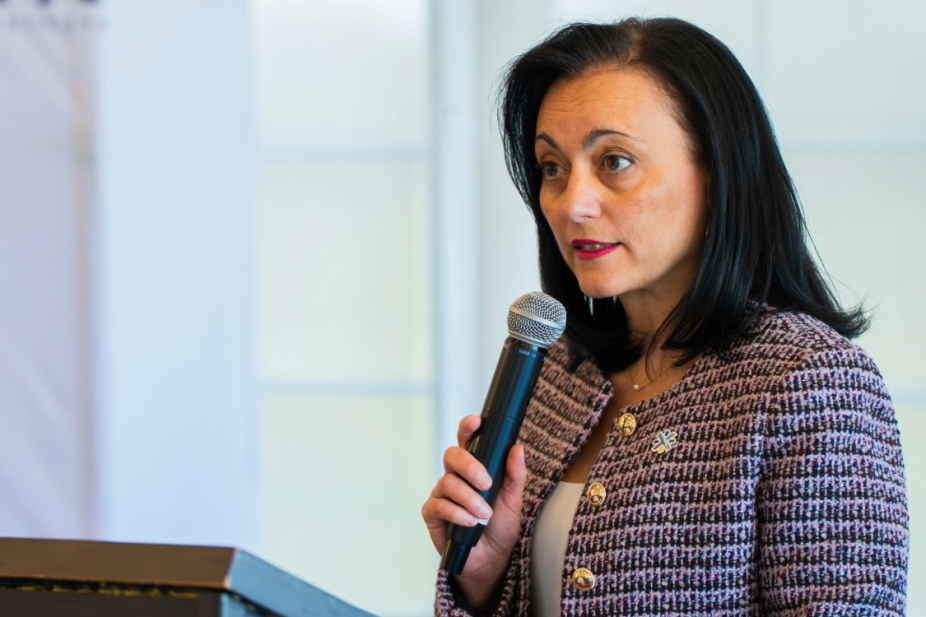
WE-SPARK’s latest report confirms its role as a regional leader in health research Dr. Dora Cavallo-Medved, interim director of WE-Spark Health Institute, speaks at a signing ceremony in June 2025 celebrating the renewal of a five-year partnership among Windsor-Essex health and academic institutions. [Photo by UWindsor] For six years WE-SPARK Health Institute has consistently delivered outcomes that positively impact the health of our community, and it shows in their 2024-2025 Impact Report. Forming in 2019, WE-SPARK quickly became a leader in fostering interdisciplinary collaboration, driving innovation, and improving health outcomes through research. The report spotlights how the institute has become the epitome of a thriving health research ecosystem for Windsor-Essex through partnerships with local hospitals, academic institutions, and community organizations, as well as aligning with the University of Windsor’s strategic priorities of research excellence, community engagement, and regional impact. Celebrating a renewed partnership in the WE-Spark Health…
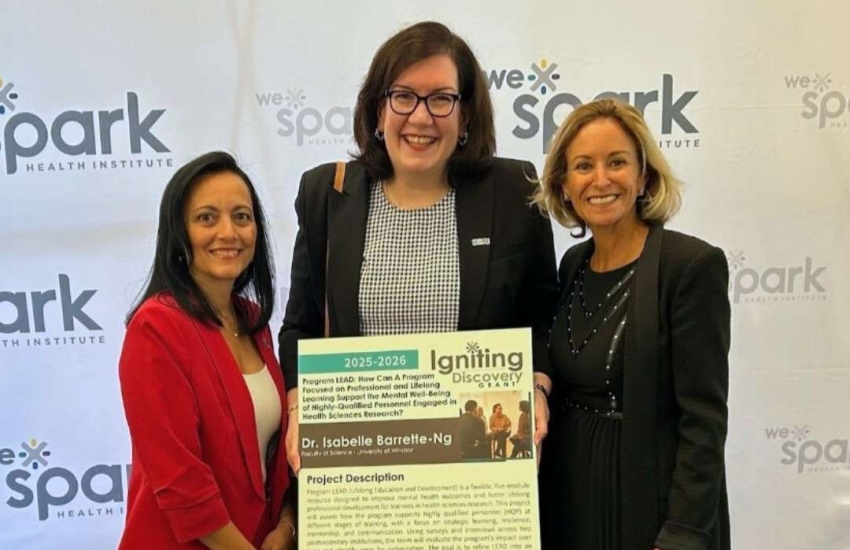
WE-SPARK Igniting Discovery Grant to champion mental well-being in health research Dr. Dora Cavallo-Medved, Dr. Isabelle Barrette-Ng and Dr. Stephanie De Franceschi pose for a photo at the WE-Spark Grant Awards night on Aug. 27, 2025 In a significant boost to mental health and professional development in the research community, WE-SPARK Igniting Discovery Grant launches Program LEAD: How Can a Program Focused on Professional and Lifelong Learning Support the Mental Well-Being of Highly Qualified Personnel Engaged in Health Science Research? The grant, set to launch this fall, supports an innovative collaboration led by Dr. Isabelle Barrette-Ng, principal investigator, Integrative Biology, Faculty of Science at the University of Windsor, in partnership with leading educators and researchers from across Canada, including St. Clair College. A Timely and Transformative Initiative In today’s fast-paced research environment, the mental health and well-being of highly qualified personnel (HQP)—including college students, graduate students, postdoctoral researchers, and…
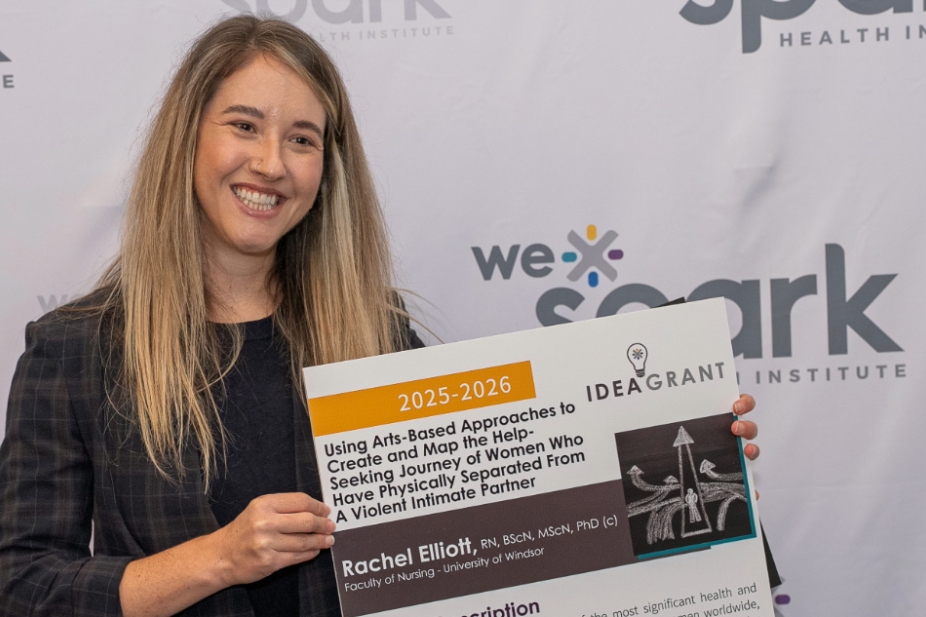
Local health research receives $499K injection from WE-SPARK and partners 2025 recipients of the IDEA Grants, Igniting Discovery Grants and Incentive Grants [KYLE ARCHIBALD/University of Windsor] Health research in Windsor-Essex just got a half a million-dollar boost. WE-SPARK Health Institute and its funding partners awarded 32 new research grants totalling $499,000 to help address pressing health challenges, at an awards ceremony at the Ambassador Golf Club on Aug. 27 This brings the total awards for local health research projects to more than $2.3 million since the institute launched its grants program in April 2020. “These grants highlight the incredible talent and collaborative spirit in Windsor-Essex,” said Dora Cavallo-Medved, interim director of WE-SPARK. “Thanks to the generosity and commitment of our local sponsors and donors, we’re able to support bold new ideas, bringing teams of experts together to help build the foundation for research aimed at improving health and well-being in our community and beyond.” Three streams distribute…

UWindsor researchers climb to new heights in high-altitude health study UWindsor research participants (left to right): Jessica Kenney, Ibrahim Wafai, Professor Anthony Bain, Brooke Shepley and Lana Yacoub. (Photo courtesy of Anthony Bain) What happens to the human body when oxygen is scarce? That was the central question driving kinesiology professor Anthony Bain and fellow researchers who recently returned from a landmark research expedition to White Mountain in California. “I’ve always been amazed by the limits of human physiology,” says Dr. Bain. “How can someone climb Everest without supplemental oxygen? How do freedivers push beyond what seems possible? These questions drive my curiosity, and altitude research is a natural extension.” The trip, co-organized by Bain with colleagues Mike Tymko of the University of Guelph and Kurt Smith of the University of Victoria, brought together nearly 30 researchers, physicians and students to study the effects of hypoxia. Hypoxia is caused by low levels of oxygen availability and typically experienced…
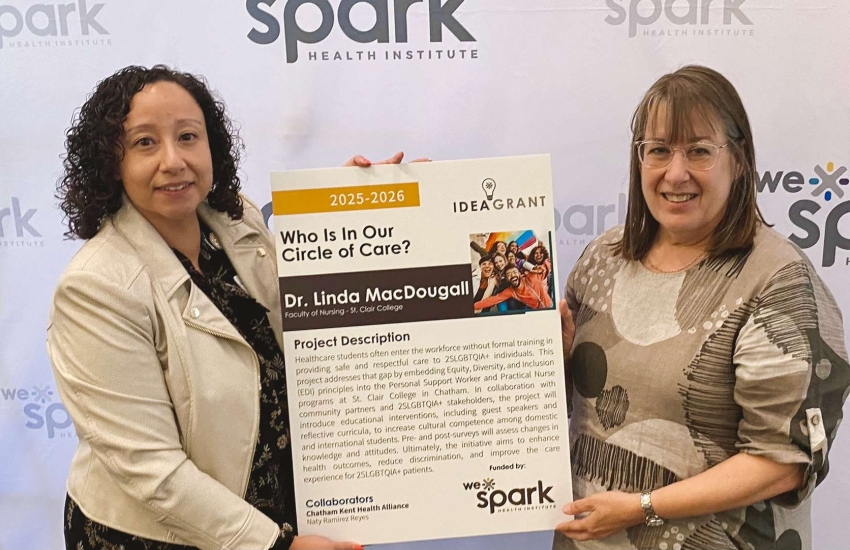
St. Clair Nursing professor secures WE-SPARK grant for research to support student EDI training Naty Ramirez Reyes of Chatham-Kent Health Alliance and St. Clair College Nursing faculty member Dr. Linda MacDougall at the WE-SPARK grant event on Aug. 27, 2025. (Linda MacDougall/St. Clair College) A St. Clair College Nursing professor at the Chatham Campus has landed a grant from WE-SPARK Health Institute which aims to promote education and training on equity, diversity and inclusion (EDI) principles. Dr. Linda MacDougall has received $3,000 from the WE-SPARK IDEA Grants program, which focuses on innovative proposals which are low-cost, small-scale pilot studies involving preliminary research projects to drive quality improvement in the healthcare sector. Dr. MacDougall’s proposal notes an education gap within curricula for Personal Support Worker and Practical Nursing students related to the care of gender and sexually diverse populations, especially those who identify as part of the 2SLGBTQIA+ community. The project aims to introduce educational interventions, including…











